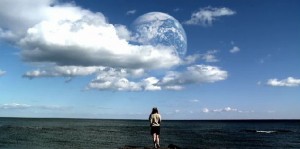film review: another earth
 Look out across the ocean and you’ll see a planet hovering above the horizon line. Its swirling clouds and green-brown rivulets of land closely resemble our own. In fact, this planet is our own, a parallel Earth.
Look out across the ocean and you’ll see a planet hovering above the horizon line. Its swirling clouds and green-brown rivulets of land closely resemble our own. In fact, this planet is our own, a parallel Earth.
The night the discovery of “Earth 2” is announced and 17-year-old Rhoda Williams (Brit Marling) has been partying too hard, celebrating her acceptance into an astrophysics course. As she’s driving home, she peers out of the car window to study the night sky. Her lapse of concentration causes a fatal accident, killing a mother and son and leaving a father in a coma.
The narrative resumes four years later, tracing Rhoda’s return to her suburban family home, after a four-year stint in prison for her act of culpable driving. The new earth still hangs in the sky, a strange addition to our planet’s skyline.
This subject matter seems unquestionably sci-fi, yet Another Earth chooses to muffle its supernatural themes. The looming idea of a second earth runs parallel to the narrative that traces Rhoda’s attempt to reassimilate back into normal life. Marling co-wrote the film with director Mike Cahill, and intimately inhabits the part of Rhoda. The actor explains that the first half becomes basically a silent movie, as Rhoda internalises her struggle to deal with the emotional lesions she carries.
An accidental relationship develops between Rhoda and the reclusive John (William Mapother) the father who was involved in the accident four years earlier; yet he remains oblivious to this fact. The onscreen awkwardness between their two characters is well executed and endearing. The score is quiet, but immaculately engineered. A different instrument plays for each character, Cello for Rhoda, piano for John.
Critics have drawn logical comparisons to another recent film exploring science-fiction themes in an obscure way, Lars Von Trier’s Melancholia. There are similarities; both films choose to explore the effect of a global phenomenon via microcosmic storytelling. Yet, the affectation of Von Trier’s affluent, disillusioned characters introduces a coldness, and the expansive, rolling grounds of the country manor where the film is set, makes it seem as if they are already living in a strange and removed kind of universe.
Another Earth’s suburban setting, in contrast, seems real and constrictive. The orb of Earth 2 stokes the idea of possibility and at once a strange sense of oppression. The characters are genuinely emotive – largely silent and introspective as in Melancholia– yet we are given reason to pity them. The gritty digital cinematography creates further warmth that was omitted by Von Trier. Another Earth would be more accurately described as a parallel to the minimalist sci-fi of Never Let Me Go or Donnie Darko. Cahill has achieved an impressive film, rendered on a small budget; it remains conceptually interesting and achieves a genuine emotional intensity.

